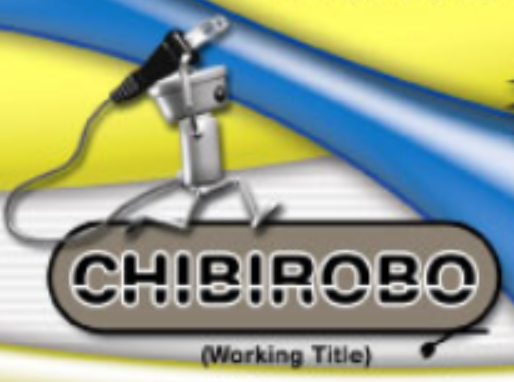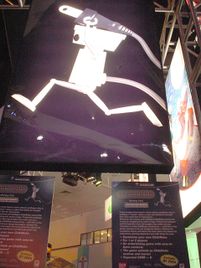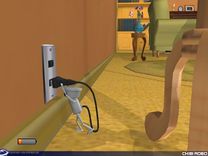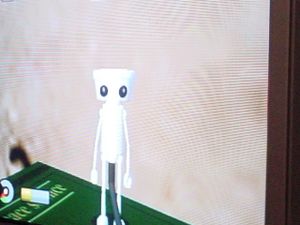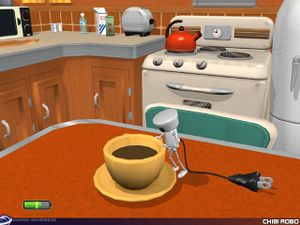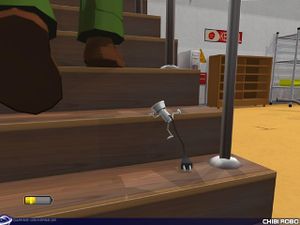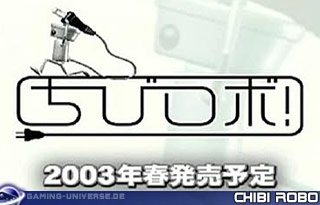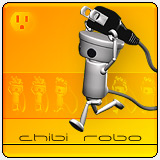ChibiRobo (lost point-and-click prototype of GameCube platform-adventure game "Chibi-Robo! Plug Into Adventure!"; 2003-2004)
Chibi-Robo! Plug Into Adventure! is a 2005 platform-adventure game developed by Skip Ltd. and published by Nintendo for the GameCube. An earlier version of the game was a point-and-click game meant to be published by Bandai in 2005 but this never came to pass.
Background
The game first appeared under the working title ChibiRobo in an IGN article from early 2003. The article gave an overview of the game's gameplay and story as well as a projected release date of June 2003 for Japan and Spring 2004 for the US.[1] The game would later make an appearance at E3 2003 where a demo was playable.[2] This was the last public appearance of the game with Bandai announcing that the game had been put on "indefinite hold." [3] Sometime after this, Nintendo picked up the publishing rights after which Nintendo's Kensuke Tanabe took over as producer and suggested moving away from the point-and-click genre later saying in an interview
"With the point-and-click style, players can feel their controlling characters only objectively. And it does not fit very well with [analog] stick control of GameCube. Because of my belief that creating a sense of identity between Chibi-Robo and the player would lead to the title's appeal more than anything else, I asked [Kenichi Nishi, the director of the game] to change [the] 'point-and-click' style to 'stick control.'"[4]
Per this suggestion Skip completely revamped the game's plot and gameplay to become Chibi-Robo! Plug Into Adventure!.
Plot
After years of hard work, Professor Sendagaya has successfully made a robot with human emotions. After hearing about this accomplishment in the newspaper, local thieves, Cookie, and Arnie, decide to break into the professor's home and steal the little guy for themselves. Unknown to them, the professor's house is guarded by an army of his 10-centimeter tall robots called ChibiRobo. The player and the ChibiRobos' job is to protect the professor's massive home from these intruders.[1]
Gameplay
Players would be able to order around a ChibiRobo (two if playing co-op)[5] with an on-screen cursor but just like the final game players would have to recharge the ChibiRobo's battery regularly. The cursor could be switched between green and red via the A and B buttons. If the green cursor is used, ChibiRobo would become curious and interact with whatever it's placed on, with the red cursor doing the exact opposite. L and R could zoom the camera in and out, and the D-Pad could shift its angle.[1]
Depending on the ChibiRobo you're currently using, it would react differently to objects and develop over time based on the player's decision and commands. For example, the little robot may stop listening to the player if indecisive or constantly cancel orders. However, if the player is certain and stern with their commands, the current ChibiRobo would gain new abilities and access areas they couldn't before.[1]
Unlike the final game, the ChibiRobos could also be upgraded with new body parts and outfits; however, these outfits served no function. There was a type of collectibles that did those being memory chips. They could range from upgrading the ChibiRobo's battery life, increasing its learning ability, enabling it to emit a variety of sounds, or even strike a pose or two.[1] While the memory chips never appeared in the final game some of their functionality with folded into other features.
Availability
Despite a playable demo being available on the E3 2003 show floor, a build of this prototype has never been leaked onto the internet, leaving it completely lost.
Gallery
Images
Videos
Provided ID could not be validated.
References
- ↑ 1.0 1.1 1.2 1.3 1.4 Chibi Robo by IGN Staff from IGN. Retrieved 28 Jan '22
- ↑ Chris’ E3 2003 Report by Chris Pruett from Chris's Survival Horror Quest. Retrieved 28 Jan 22
- ↑ Chibi Robo in Limbo by IGN Staff from IGN Retrieved 28 Jan 22
- ↑ C3 Exclusive Interview | Skip, Ltd Talks Nintendo, Chibi-Robo DS, GiFTPiA & More! by Adam Riley from Cubed³ Retrieved 28 Jan '22
- ↑ Tweet from @chibirobotweets showing the game's E3 2003 booth. Retrieved 28 Jan '22
